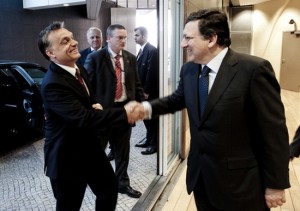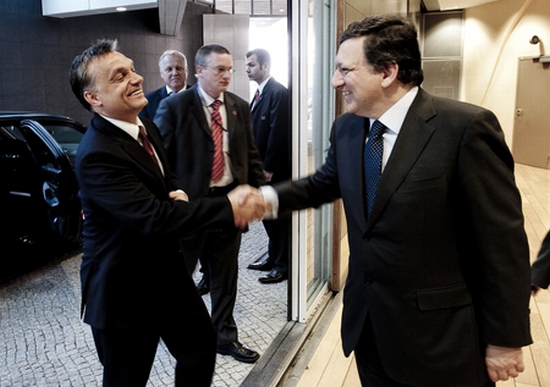Published: 5.6.2015
 José Manuel Barroso, the outgoing President of the European Commission, has handed Prime Minister Viktor Orbán the documents of the partnership agreement Hungary is signing with the Commission.
José Manuel Barroso, the outgoing President of the European Commission, has handed Prime Minister Viktor Orbán the documents of the partnership agreement Hungary is signing with the Commission.
Barroso said the European Union has been successful in addressing the financial crisis and is now on its way to emerging from it, thanks to solidarity and taking responsibility. “Hungary is one of the biggest beneficiaries of European solidarity,” he said. Between 2007 and 2013 the EU had supported over 63 development projects, spending HUF 8,200 billion. In 2014-2020 Hungary will receive HUF 8 billion more than what it contributes to the EU budget, Barroso said, adding that the funding should be spent as efficiently as possible.
EU funding will hold many advantages for the Hungarian economy and the Hungarian people, and the country can become much more developed by 2020, he said. The past decade had been full of exceptional challenges for Europe; the large-scale enlargement in 2004 and then others later in the decade, almost doubling membership in just ten years. But the Commission has been able to help Europe stay unified and open and to become stronger in a globalised era, he added.
The partnership agreement Hungary is signing with the European Commission serves the interests of the country in their entirety, Orbán said after receiving the document. He said the aim was to channel 60% of the available funding into the Hungarian economy and added that Barroso had been supportive of that aim.
The system of handling and managing funds has been simplified and made more transparent to better serve the government’s economic policy on development, which the union has also accepted, Orbán said. The amount of money taken out of the country in the form of profits by foreign investors about equalled the amount of EU funding received by the country. “In other words, if we did not have an EU subsidy system, the balance of the national economy would tip,” he said.
Hungary was screened head to toe: Orbán
If the money were used wisely, Hungary could be a well-developed country in seven years, able to finance itself and pay off its debt ahead of time. Hungary in the ten years of “finding its place” in the EU and especially in the post-2010 period has built into the Union’s framework of policies its own social and economic models, Orbán said.
It had also accepted the EU’s basic pillars of democracy, market economy, national sovereignty and enhanced European integration. He noted that because of its disputes with the EU, Hungary is the only member state which has been screened “from head to toe” in terms of being in line with European values.
This was due to the country adopting a new constitution relatively late. The disputes had been settled, with the exception of changes to the ombudsman’s post, which was still pending approval by the Commission.
“Hungary has always accepted the Commission as the only impartial party within the Union,” Orbán said, thanking Barroso for the fair and equal treatment given to Hungary.
The agreement paves the way for investments worth EUR 21.9 billion in Cohesion Policy funding over 2014-2020. Hungary is also receiving EUR 3.45 billion for rural development and EUR 39 million for fisheries and the maritime sector.
Nothing to be proud of: opposition
The opposition Socialist Party and the Democratic Coalition voiced sharp criticism over the government’s EU policy after Hungary received the agreement on EU funding.
The Socialists said Orbán is a lot less militant with the European Union when “the enemy comes with a bag of money” than in other situations. Socialist MEP István Ujhelyi said that while “European values stink for Orbán, euros received as a gift do not”.
Ujhelyi insisted that most projects in Hungary are financed from community funds, and without Europe’s assistance the national economy would soon go bankrupt. That is why, he said, Hungary should have an appropriate share of Europe’s resources.
He accused the ruling parties of “blackmailing” towns and cities through suggesting that if their residents vote for other parties, further developments could not be financed, and insisted that the financing comes from the EU rather than from the government.
“The government has also lied that they had successfully negotiated financing for the next cycle, whereas we will get a few billion euros less than before,” Ujhelyi said. From 2014-2020, EU cohesion funding for Hungary will be actually reduced by HUF 150,000 per capita, he argued.
According to the Democratic Coalition (DK), Orbán has “nothing to be proud of” because he had only managed to secure HUF 1,300 billion less for 2014-2020 than DK head Ferenc Gyurcsány had negotiated for the previous cycle when he was prime minister. DK’s managing deputy chair, Csaba Molnár, said “this shows which prime minister has been more successful and who was considered as an equal partner in the EU”.
budapesttimes.hu – 19.09.2014
